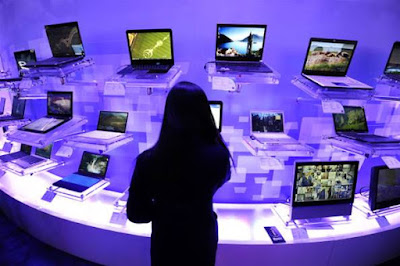If you need computing capability while traveling and during lectures or meetings, you may
find a laptop or tablet to be an appropriate choice.
With the abundance of mobile computer manufacturers,
research each before making a purchase. The following are
purchasing considerations unique to mobile computers.
1. Determine which mobile computer form factor
fits your needs.
Consider a tablet or ultra-thin laptop
if you require a lightweight device and the most
mobility. If you require additional ports or want the
computer’s capabilities to be more comparable to a
desktop, consider purchasing a traditional laptop.
2. Consider a mobile computer with a sufficiently large screen.
Laptops and tablets
are available with various screen sizes. For example,
most traditional and ultra-thin laptop screens range
in size from 11 to 18 inches, while most tablet
screens range in size from 7 to 12 inches.
3. Experiment with different keyboards and
pointing devices.
Mobile computers often vary
in size, and for that reason have different keyboard
layouts. Familiarize yourself with the keyboard layout
of the computer you want to purchase, and make
sure it is right for you. If you have large fingers,
for example, you should not purchase a computer
with a small, condensed keyboard. Laptops typically
include a touch-pad to control the pointer. Tablets
have a touch screen and an on-screen keyboard.
4. Consider processor, memory, and storage
upgrades at the time of purchase.
As with a
desktop, upgrading a mobile computer’s memory and
internal storage may be less expensive at the time
of initial purchase. Some internal storage is custom
designed for mobile computer manufacturers, meaning
an upgrade might not be available in the future.
5. The availability of built-in ports and slots
is important.
Determine which ports and slots you require on the
mobile computer. If you plan to transfer photos from
a digital camera using a memory card, consider a
mobile computer with a built-in card slot compatible
with your digital camera’s memory card. If you plan
to connect devices such as a printer or USB flash
drive to your mobile computer, consider purchasing
one with a sufficient number of USB ports. In addition,
evaluate mobile computers with ports enabling
you to connect an external monitor.
6. If you plan to use your mobile computer for
a long time without access to an electrical
outlet, or if the battery life for the mobile
computer you want to purchase is not sufficient,
consider purchasing a second battery.
Some mobile computers, such as most tablets and
ultra-thin laptops, have built-in batteries that can be
replaced only by a qualified technician. In that case,
you might look into options for external battery
packs or power sources.
7. Purchase a well-padded and well-designed
carrying case that is comfortable and ergonomic.
An amply padded carrying case will
protect your mobile computer from the bumps
it may receive while traveling. A well-designed
carrying case will have room for accessories
such as USB flash drives, pens, and paperwork.
Although a mobile computer may be small enough
to fit in a handbag, make sure that the bag has
sufficient padding to protect the computer. Test the
carrying case with the laptop inside to ensure it is
comfortable and ergonomic.
8. If you plan to connect your mobile computer
to a video projector, make sure the mobile
computer is compatible with the video
projector.
You should check, for example, to be sure
that your mobile computer will allow you to display
an image on the screen and projection device at the
same time. Also, ensure that the mobile computer
has the ports required or that you have the necessary
dongle and cables to connect to the video projector.
Consider This: Based on your current computing
needs, should you purchase a traditional laptop,
ultra-thin laptop, or tablet? What are the specifications
of the mobile computer you would purchase?
























No comments:
Post a Comment